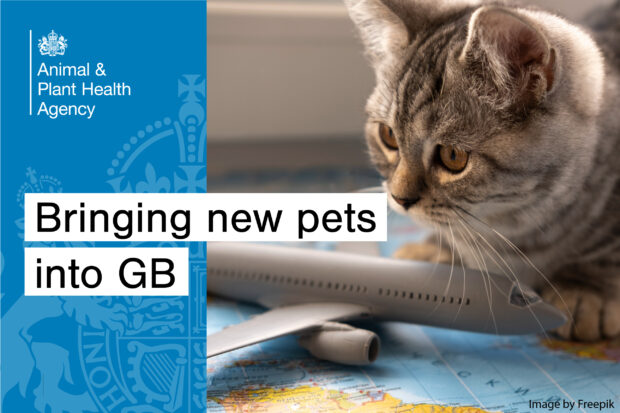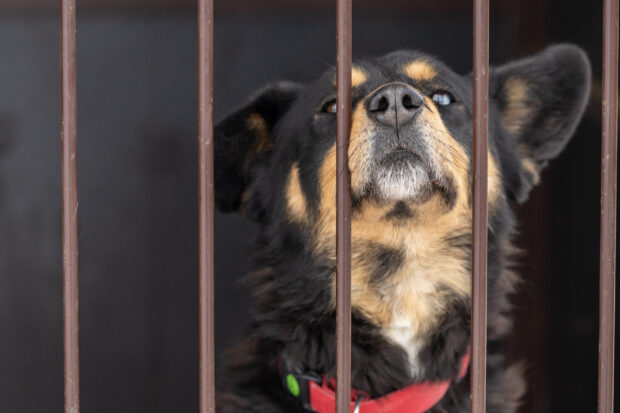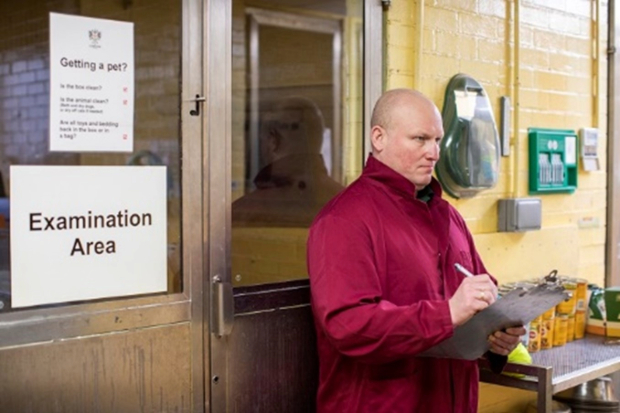
When searching for a new furry friend, the best place to start is right here in Great Britain (GB), whether that means adopting, rehoming, or buying from a reputable breeder. Supporting pets in need close to home not only helps reduce the number of animals in rescue centres but also ensures a smoother transition for both pet and owner.
That said, we understand it is not always that simple. With the rise of online listings featuring animals from overseas, finding that dream pet from abroad has never been easier… or more tempting.
However, imagine waiting weeks with anticipation and excitement for your pet, preparing for its arrival and dreaming of bringing it into your life, to then be told that on arrival at the port, the animal did not meet the GB entry requirements and would not be permitted to continue its journey to your home.
Unfortunately, this is something APHA inspectors see far too often - where animals are imported that are very poorly or do not have the correct health status documentation and must then be held in quarantine. This causes undue stress on the animals and new owners, with any extra costs to fund quarantine kennels or veterinary care having to be paid. It can be months before an animal is released from quarantine.
In this blog, we explain what is needed to bring a happy and healthy animal into GB to become a much-cherished pet, whilst keeping the country safe from diseases that effect both animals and humans.
Extensive research is fundamental before considering rescuing or purchasing a new pet from abroad, to ensure the animal is suitable and has a safe and comfortable travel experience.
Although it will become your pet once it is delivered to your home, during its journey and at the point of entry into GB, it is a cat or dog that is being transported for a commercial purpose and is subject to the necessary import regulations.
Research the rescue centre or breeder
This is a priority action that could prevent issues later. Prospective owners are encouraged to research before committing to taking ownership:
- Consider customer reviews and feedback, where are they based and what support is offered after purchase.
- Age of cat or dog, where was it born, and what country it is in. Pets must be microchipped, and rabies vaccinated in their country of origin and follow the import preparation requirements for that country.
- Video footage and photographs. Details of the breed and temperament. Does it match your family/specific circumstances and environment?
- Details of any pre-existing injuries or conditions and any treatment or medicines it is receiving.
- Information on the transporter who will be bringing your new pet into GB and their contact details.

Minimum requirements and documentation
It can be the rescue centre or breeder’s responsibility to arrange all the logistics for your pet to enter GB, but as the new owner you are responsible for any fees should your pet be non-compliant with the GB entry requirements. Ask lots of questions to satisfy your new pet is fit to travel and ask for copies of documents where possible in advance. Question ‘why’ if you are asked to pay more for official documents at the last moment or during transit.
Some of the basic rules for importing into GB are:
- All cats and dogs must be identified with a microchip before rabies vaccination or tapeworm treatment is administered.
- Animals must be at least 12 weeks of age before they can be vaccinated against rabies, and they must be vaccinated in accordance with the vaccine manufacturer’s instructions. Check what vaccine has been used, as your pet may need multiple doses or may need to wait longer before it is eligible to travel.
- Dogs travelling from most countries into GB must be treated for tapeworm between 24-120 hours before arriving into GB.
- The rules are different depending upon where your pet is travelling from. Check GOV.UK for further information.
If you are in GB and taking ownership of an animal from abroad, even if it is a gift from a friend or family member and/or no money has changed hands, your new pet will need to follow the Balai Rules as they cannot enter under the pet travel rules. Be wary if you are asked for your own passport details by anyone associated with the pet, as this is not necessary and may be an indicator that the import rules are not being followed correctly.
Welfare during transport

Reputable rescue centres and breeders will prioritise animal welfare by using appropriately authorised transporters to ensure the welfare of your pet throughout their journey, and minimisation of stress, so ask about the status of the transporter. Some of the welfare issues being seen by APHA are:
- Long journeys (days).
- Animals not fit for the journey.
- Poor temperature control and ventilation in the vehicle.
- Cramped conditions, unsuitable size or damaged crates used.
- Not taken out of the vehicle from departure to destination.
- Food and water withheld to prevent soiling and reduce need to clean crates.
Your new pet must also be delivered directly to the destination declared on the official documents by the transporter, where they must stay for a minimum of 48 hours. It is against the law to collect your new pet from a public area such as a motorway service station or car park.
Protecting our borders from the risk of diseases
This is of vital importance not just for the health of your new pet and you, but to also protect GB.
Zoonotic diseases, which can be transmitted from animals to humans such as Rabies and Echinococcus multilocularis (tapeworm), can have potential devastating health effects on the pet as well as carrying the risk of passing it on to other animals and humans.
Rabies antibody testing and testing for Brucella Canis, another zoonotic disease that can potentially be imported with pets, is carried out at APHA’s reference laboratory in Weybridge. Vital horizon scanning surveillance work is also carried out to monitor the risks and to help prevent exotic diseases entering the UK.
Further information:
Rabies: risk assessment, post-exposure treatment, management - GOV.UK
Brucella canis: information for the public and dog owners - GOV.UK
Bringing your pet dog, cat or ferret to Great Britain: Which pet travel document you need - GOV.UK
Import live animals and germinal products to Great Britain under Balai rules - GOV.UK

Recent Comments